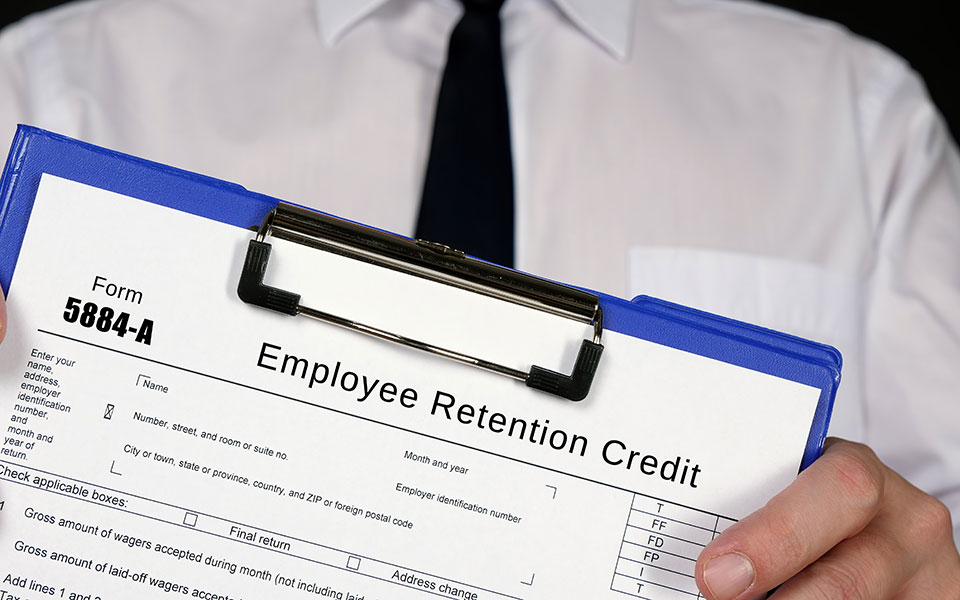Employee Retention Tax Credit (ERTC) Claims Under Scrutiny: Key IRS Developments Explained
By David Shuster, Partner, Tax & Business Services
Significant recent developments have occurred regarding Employee Retention Tax Credit (ERTC) claims. These include new announcements and actions by the IRS that may impact your business. We have summarized these updates below to keep you informed and help you navigate any potential issues.
On 6/20/24, following a detailed review of ERTC claims, the IRS announced plans to deny “tens of thousands” of them because they “show clear signs of being erroneous,” containing “warning signals that clearly fall outside the guidelines established by Congress.” The IRS estimated that 10%-20% of the claims it analyzed fell into this so‑called high-risk group. These “will be denied in the weeks ahead” if they haven’t already been denied. Another 60%-70% of claims “show an unacceptable level of risk.” For this category, the IRS will conduct additional analysis to gather more information to speed the resolution of valid claims while protecting against improper payments. The remaining 10%-20% of claims not falling into the first two groups show a low risk, with the IRS anticipating that payments on these claims will go out later this summer, if not already.
At the time of its announcement, the IRS stated that claims submitted after it announced its claims‑processing moratorium last September wouldn’t be processed until further notice. The IRS has since announced, on 8/8/24, that “it will now start judiciously processing claims filed between Sept. 14, 2023, and Jan. 31, 2024,” with “work focus[ing] on the highest and lowest risk claims at the top and bottom of the spectrum,” meaning the IRS will begin taking action on those claims filed in that period where the IRS believes there is a “sound basis to pay or deny a refund claim.”
The IRS advised that businesses with pending claims should not call the IRS to inquire about their status, as additional information is generally unavailable. The IRS further advised that businesses that may have submitted improper claims that remain pending or have been granted but the check has not yet been cashed or deposited should consider using the IRS’s withdrawal process to avoid interest and penalties.
On 7/26/24, the IRS announced what it believes are five new warning signs of incorrect ETRC claims. This is in addition to seven warning signs the IRS previously announced. The five new ones are:
- Essential businesses during the pandemic that could fully operate and didn’t have a decline in gross receipts.
- Businesses unable to support how a government order fully or partially suspended business operations.
- Businesses reporting family members’ wages as qualified wages.
- Businesses using wages already used for Paycheck Protection Program loan forgiveness.
- Large employers claiming wages for employees who provided services.
The seven previously announced warning signs are:
- Too many quarters are being claimed.
- Government orders that don’t qualify.
- Too many employees and wrong calculations.
- Businesses citing supply chain issues.
- Businesses claiming ETRC for too much of a tax period.
- Businesses that didn’t pay wages or didn’t exist during the eligibility period.
- Promoters saying there’s nothing to lose.
The IRS reiterated the options for businesses discovering they may have questionable ETRC claims. These include withdrawing such claims and amending returns to correct overstated claims.
In both its 6/20/24 and 7/26/24 announcements, the IRS mentioned the possibility of reopening its ERC voluntary disclosure program that closed in March 2024, with the latest update being that the IRS was “in the final stages of reopening the ERC Voluntary Disclosure Program for a brief period,” and that “[a]dditional details are expected to be available shortly.” Under the closed program, applicants had to return only 80% of their ERC refunds, with no interest, among other terms. Any reopened program will likely have less favorable terms.
Lastly, we know that some ERTC claimants have recently received notices from the IRS denying their ERTC claims. Such claimants may administratively appeal these denials to the IRS Independent Office of Appeals and sue for their refunds. An appeal should be filed within 30 days of the IRS notice denying the claim, and a refund suit must be filed within two years of the notice denying the claim.
Please contact your trusted Marcum professional to discuss withdrawing an ETRC claim, to find out whether voluntary disclosure involving your paid ERTC claims is an option, or to learn more about appealing or suing on your denied ERTC claim.






